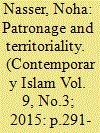| Srl | Item |
| 1 |
ID:
145042


|
|
|
|
|
| Summary/Abstract |
Today’s cosmopolitan Western City contains large numbers of sub-cultures within its neighbourhoods, streets and buildings that are re-configuring the norms of citizenship and place. This paper examines the role of citizenship as a sense of cultural identity, territorial belonging and place attachment in the building of three mosques in Adelaide across a 100-year time span. Starting with the colonial period and the building of the first mosque in Australia up until the post-colonial period of large-scale Muslim immigration to Australia, the paper demonstrates the forms of social organization and patronage that were created as a strategy for collective action to make the building of these mosques possible. Set against the marginal political position of Muslims in Australia throughout this period, this paper shows the creativity of social and resource mobilization to stake a claim for the ownership of land in the Western City and to define a Muslim ethnic boundary.
|
|
|
|
|
|
|
|
|
|
|
|
|
|
|
|
| 2 |
ID:
166632


|
|
|
|
|
| Summary/Abstract |
Ethnicity is a social construct that can be conceptualised as a social classification delineating certain boundaries between an ethnic group and the dominant group. Members of an ethnic group are assumed to share similar cultural characteristics and to be homogenous among themselves. Many studies in ethnic organisations have indicated that subethnicity also exists within an ethnic group, but research on subethnicity is scant. Based on the findings of an exploratory study conducted in Vancouver, Canada, we examined how, at an interpersonal level, place of origin, language, mutual bias and discrimination and transnational politics divide the Chinese diasporic community subethnically. Meanwhile, being Chinese in the Canadian context and willingness to break the subethnic boundaries are noted as counterforces to the subethnic divide. We contend that interpersonal interaction is an imperative dimension for the understanding of the shaping of boundary between different subethnic groups.
|
|
|
|
|
|
|
|
|
|
|
|
|
|
|
|